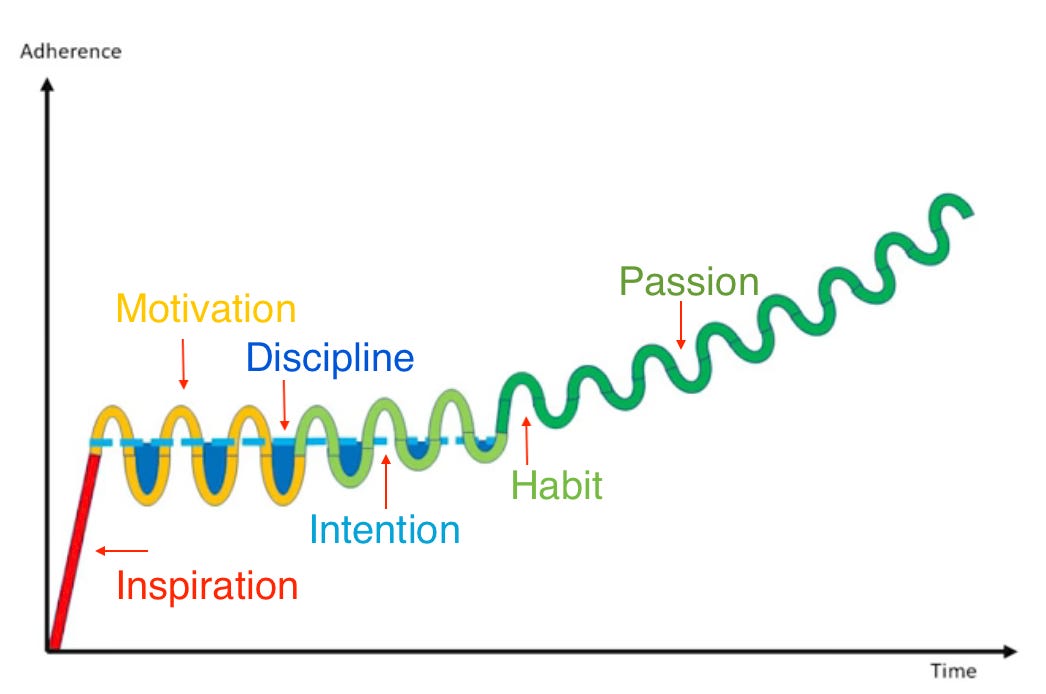Best Way To Lose Weight? Is Not What You Think
Not just diet and exercise

A rarely asked question, the best system to lose weight is the one you can sustain. While diet and, or exercise is part of it, we focus too much on this or that diet, this or that exercise routine
David D. Burns, a psychiatrist and adjunct professor emeritus in the Department of Psychiatry and Behavioral Sciences at the Stanford University School of Medicine, that evolved cognitive behavioural therapy, explains how he developed new techniques to eliminate resistance, meaning, when it comes to change we're all ambivalent we want to change and yet we have one foot put in the water and one foot on the shore.
As he continues, many people like to lose some weight, however, when explained how that would happen, there are only two things you can do and they both suck, one start eating less palatable food instead of that yummy doughnuts, the others you get out and exercise, what you want is to be thin and attractive but you don't want to lose weight, and that it shows resistance
In the Constructs of Adherence, Dr. Mike Israetel, a PhD in Sport Physiology from East Tennessee State University and professor in the strength and hypertrophy masters program at Lehman College, he lays out what and why adherence is so important, why Inspiration only will not get you there, and why Habit and Passion amongst others are the keys to long term success with 4 answers What is it, What is it good for, What is it not good for and How can we boost it.
The 6 Constructs of Adherence for weight loss
See graph below
- Adherence can be broken up into 6 constructs
- These constructs occur in phases, in some sense one after another
- We can benefit greatly by understanding each, and doing the right
- Stuff at each time point to maximize our adherence
- Inspiration
- Motivation
- Intention
- Discipline
- Habit
- Passion
Inspiration (Red)
- What is it? the spark that gets you to want to start a diet.
- What is it good for? getting you to start
- What is it not good for? sustaining you for longer than a day
- How can we boost it? Being around inspirational people. Seeing you’re out of shape Seeing diet success stories
Motivation (Yellow)
- What is it? The inner desire to want to diet
- What is it good for? Fueling your adherence day to day after inspiration has waned
- What is it not good for? Being your support every day
- How can we boost it? Having a clear end goal for the diet Being around positive people Seeing positive results from your efforts and letting them sink in Overcoming temptations and being proud of that
Intention (Blue)
- What is it? a commitment to executing a plan not just a goal, but a road map and "what to do." "my goal is to lose x kilos, but I intend to eat 4 balanced meals a day to get there!"
- What is it good for? Setting up clear "what to do" and "what not to do" instructions. You are motivated for a goal, but the intention is how you get there. Without intentions, goals are just wishes!
- What is it not good for? You still have to do the work to meet your intentions.
- How can we boost it? Having a clear diet plan to follow. Having a bit of wiggle room, but not too much. Having a coach or other know your plan and hold you to it.
Discipline (Dark Blue fill)
- What is it? The use of willpower to get you to meet your intentions.
- What is it good for? closing the gaps between motivation and intention on your "low days" so that adherence is on.
- What is it not good for? Willpower runs out quickly and needs to recharge regularly. You need the motivation to be close to good enough for your intentions for discipline to bridge the gap over and over.
- How can we boost it? knowing that there will be hard times and not being surprised coaches and friends Practice... Exerting willpower and recharging makes it stronger next time.
Habit (green)
- What Is It? The Automation of Dieting So That Motivation Waxes and Wanes a Lot Less the Longer You Diet.
- What Is it Good for? Creating Less of a Demand for Discipline and Raising Adherence Abilities Once Diets Are Habits, Success Rates Skyrocket Allowing Adherence to Be Long Term
- What Is It Not Good for? Giving You an Initial Spark Making You Fall in Love With the Dieting Process
- How Can We Boost It? Using Bulk Meal Prep and Using Similar Foods Week to Week Having Similar Meal Times Day to Day Time Executing the Diet (4-6 Weeks in, Most Diets Get Much More Habitual)
Passion (dark green)
- What Is It? The Love Of The Dieting Process
- What Is It Good For? Fueling your adherence to insane levels, leading to either easy and fun healthy dieting for good or to the ability to diet much harder and get super shredded
- What Is It Not Good For? It's Not Something We Can Just Get in a Few Weeks, It Takes Months and Years You Can Inspire People in Minutes, but You Can't Make Them Passionate in Even Weeks
- How Can We Boost It? Let the successes of dieting get to your head Diet with friends and like-minded people Take diet breaks when needed and never let dieting become a terrible route to suffering Have fun with your diet by getting into cooking, recipes, etc. Help others with their diets

Conclusion:
The key to truly sustainable weight loss goes far beyond simply finding the right diet or exercise plan. While those elements are certainly important, the real foundation for long-term success lies in cultivating adherence - the ability to stick with lifestyle changes over months and years, not just weeks or days.
As outlined in this post, adherence can be broken down into six distinct constructs that individuals experience in phases: inspiration, motivation, intention, discipline, habit, and passion. Understanding and strategically nurturing each of these constructs is crucial for making weight loss efforts stick.
Inspiration provides that initial spark to want to change, but relying on it alone is fleeting. Motivation then fuels the day-to-day commitment, but it will naturally ebb and flow. Clear intentions in the form of a structured plan turn vague goals into an actionable roadmap. Discipline and willpower help bridge the gaps when motivation wanes.
However, the real gamechanger for adherence is developing habits, which transform behaviors into unconscious patterns requiring less mental effort. This frees people from relying so heavily on limited motivational resources. Ultimately, cultivating a genuine passion and love for the process leads to the highest levels of dietary adherence.
Fostering passion takes time but pays incredible dividends. It involves finding joy in aspects like cooking, experimenting with new recipes, sharing experiences with a supportive community, and taking pride in helping others along their journeys. Diet breaks become healthy rituals to avoid burnout rather than viewing them as failures.
The path to lasting weight loss success is non-linear and deeply personal. There is no one-size-fits-all approach because individuals will require different strategies and time frames for each adherence construct. Understanding these phases empowers people to be self-aware, identify their current sticking points, and adjust their mindset and methods accordingly for the long haul.
While quick fix diets will always have their allure, sustainable weight loss is a marathon, not a sprint. By nurturing the six adherence constructs of inspiration, motivation, intention, discipline, habit, and passion, anyone can finally make lasting lifestyle changes and achieve their goals while protecting their overall well-being.
10 Key Takeaways:
- Adherence is the foundation for long-term weight loss and requires more than just inspiration or motivation.
- Inspiration provides the initial spark to start a weight loss journey, but it alone is not enough to sustain the effort.
- Motivation fuels the day-to-day desire to stick to a diet, but it can wane over time and needs reinforcement.
- Intention involves committing to a specific plan of action, not just a goal, to guide the weight loss process.
- Discipline is the willpower required to bridge the gaps between motivation and intention, but it is a limited resource.
- Habit formation is crucial for automating the weight loss process, reducing the need for discipline and increasing the likelihood of success.
- Passion, or a genuine love for the weight loss process, can fuel adherence to an extraordinary level and make healthy habits enjoyable and sustainable.
- Cultivating passion takes time and involves finding joy in aspects like cooking, sharing experiences with like-minded individuals, and helping others.
- Diet breaks and avoiding a punishing mindset are essential for preventing burnout and fostering a positive relationship with the weight loss journey.
- Understanding the constructs of adherence can help individuals tailor their approach, identify areas for improvement, and achieve long-lasting weight loss success.
Thanks for reading my blog. Subscribe to get 1 actionable insight to improve your mental or physical health backed by medical research, every Saturday.
Citations
https://nutriadmin.com/blog/motivation-to-lose-weight/
https://stanfordmag.org/contents/mind-over-misery
https://www.newtraderu.com/2024/01/12/using-discipline-instead-of-motivation/
https://www.pesi.com/blog/details/1828/why-psychotherapy-succeeds-or-fails-i-believe-i-found
https://www.ncbi.nlm.nih.gov/pmc/articles/PMC3441783/
https://www.ncbi.nlm.nih.gov/pmc/articles/PMC9316956/
https://feelinggood.com/science-behind-t-e-a-m-therapy/
https://www.academia.edu/50888930/Renaissance_Diet_2_0_Mike_ISraetel
https://www.logicmindandhealth.com/2021/03/19/overcoming-resistance-to-change/
https://www.jamesstuber.com/adherence/
https://www.fitpowermke.com/articles/constructs-of-adherence-part-1
https://www.pt-helper.com/the-path-to-exercise-adherence/




